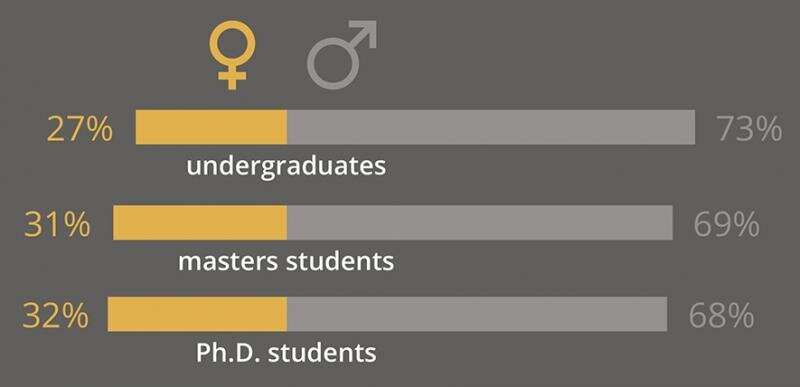
New research shows the gender gap in the teaching and study of economics is still dramatic and actually getting worse. Economists argue that this is not just a problem for the discipline, but for society as a whole.
Women are underrepresented "at almost every level" within the discipline of economics in UK universities, according to a new report co-authored by a Cambridge economist.
In fact, Dr. Victoria Bateman says the new report for Royal Economics Society (RES) reveals signs of "stagnation and retreat" in the closing of gender gaps across the study of economics—with female intake (relative to male) actually falling at both undergraduate and master's levels over the last two decades.
Published today, the report, "Gender Imbalance in UK Economics," marks 25 years since the establishment of the RES Women's Committee, which was set up to monitor and advance the representation of women in UK economics.
"The economy affects everyone, and economists need to represent us all," said Bateman, an Economics Fellow at Gonville and Caius College. "If they don't, that's a major barrier to building a solid understanding of the economy."
"Across all students, from undergraduate to Ph.D., there are twice as many men studying economics as there are women in UK universities. While in many respects the discipline of economics has come a long way in the 21st century, the gender gap is clearly still real, persistent and in some ways getting worse."
Bateman and colleagues argue that attracting, retaining and promoting female economists is a "particular problem" within UK academia when compared to areas of government and third sector organizations such as think tanks.
Only a quarter (26%) of economists working in UK academia are female, and only 15% of economics professors are women, compared to 38% of the economists at the UK Treasury and 44% of researchers at economic think tanks.
Among UK students entering the discipline, the gender gap has actually widened since 2002, when 31% of economics undergraduates and 37% of master's students were women. By 2018, this had fallen to 27% and 31% respectively. Bateman says these statistics show that the closure of the gender gap in economics "isn't simply a matter of time".
"Only a third of economics lecturers in the UK are women, and just fifteen percent of economics professors," said report co-author Dr. Erin Hengel, who received her Ph.D. in economics from Cambridge before going on to lecture at the University of Liverpool.
"While these figures are better than they were twenty-five years ago, the improving trend has leveled off. It appears that progress is starting to slow far before we reach any kind of gender parity."
When the report's authors factored in ethnicity, the percentage of female students was higher. In 2018, a third (33%) of Black economics undergraduates and 31% of Asian ethnicity undergraduates were women, compared to a quarter (25%) of White students.
However, women from ethnic minority backgrounds are not staying in academic economics. The report also found that at Ph.D. level, the proportion of women is ten percentage points lower among minority candidates than white candidates.
Perhaps startlingly, the report found that between 2012 and 2018 there was not a single Black woman employed as a professor of economics anywhere in the UK.
Bateman says she hopes the new report will serve as a "call to arms" for the discipline of economics. "We are calling on universities to ask themselves why so few UK women are attracted to studying and researching the economy and why, even when they are, they do not stay," she said.
Bateman's 2019 book The Sex Factor showed how the status and freedom of women are central to prosperity, and that "gender blindness" in economics has left the discipline wide of the mark on everything from poverty and inequality to understanding cycles of boom and bust.
"Unless economists are diverse, we cannot hope to build a complete understanding of the economy, and, with it, formulate the right kinds of policies," Bateman added.
Citation: Report: Women economists underrepresented 'at every level' in UK academia (2021, July 13) retrieved 13 July 2021 from https://ift.tt/3r4KMMc
This document is subject to copyright. Apart from any fair dealing for the purpose of private study or research, no part may be reproduced without the written permission. The content is provided for information purposes only.
Report: Women economists underrepresented 'at every level' in UK academia - Phys.org
Read More
No comments:
Post a Comment